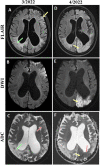Acute onset of diabetes and rapid cognitive decline in a patient with mitochondrial encephalomyopathy, lactic acidosis, and stroke-like episodes syndrome
- PMID: 37073829
- PMCID: PMC10241238
- DOI: 10.1530/EDM-22-0416
Acute onset of diabetes and rapid cognitive decline in a patient with mitochondrial encephalomyopathy, lactic acidosis, and stroke-like episodes syndrome
Abstract
Summary: Mitochondrial diseases are a group of rare diseases presenting with heterogeneous clinical, biochemical, and genetic disorders caused by mutations in the mitochondrial or nuclear genome. Multiple organs can be affected, particularly those with high energy demand. Diabetes is a common endocrine manifestation of mitochondrial diseases. The onset of mitochondrial diabetes can be latent or acute, and the presenting phenotype can be type 1- or type 2-like. Studies show that diabetes ais associated with latent progression of cognitive decline in patients with mitochondrial encephalomyopathy, lactic acidosis, and stroke-like episodes (MELAS) syndrome. Herein, we report a case of rapid cognitive decline after the acute onset of diabetes in a patient with MELAS syndrome. The patient was a 36-year-old woman who was hospitalized due to hyperglycemic crisis and seizures. She was diagnosed with MELAS syndrome two years previously, and had gradually progressing dementia and hearing loss. However, following the acute onset of diabetes, she developed rapid cognitive decline and loss of ability to perform daily activities. In conclusion, the acute onset of diabetes could be an associated risk factor for rapid cognitive decline in patients with MELAS syndrome. Thus, these patients as well as healthy carriers with related genetic mutations should undergo diabetes education and screening tests. Moreover, clinicians should be aware of the possibility for acute onset of hyperglycemic crisis, particularly in the presence of triggering factors.
Learning points: Diabetes is a common endocrine manifestation of mitochondrial diseases, presenting with a type 1- or type 2-like phenotype depending on the level of insulinopenia. Metformin should be avoided in patients with mitochondrial diseases to prevent metformin-induced lactic acidosis. Mitochondrial diabetes can manifest before or after the onset of MELAS syndrome. In patients with MELAS syndrome, diabetes can initially manifest with a life-threatening severe hyperglycemic crisis and can cause rapid cognitive decline. Diabetes screening tests (e.g. hemoglobin A1c, oral glucose tolerance test, or random blood glucose level measurement) should be performed either systematically or in the presence of symptoms, particularly after triggering events. Genetic testing and counseling should be provided to patients and their families for the purpose of better understanding the inheritance, progression, and possible outcomes of the disease.
Conflict of interest statement
The authors declare that they have no conflicts of interest that could be perceived as prejudicing the impartiality of the research reported.
Figures


Similar articles
-
Hyperglycemic Crisis in Patients With Mitochondrial Encephalopathy, Lactic Acidosis, and Stroke-like Episodes (MELAS).Pediatr Neurol. 2021 Jan;114:1-4. doi: 10.1016/j.pediatrneurol.2020.09.013. Epub 2020 Sep 30. Pediatr Neurol. 2021. PMID: 33189023
-
Delay in diagnosing a patient with mitochondrial encephalomyopathy, lactic acidosis, and stroke-like episodes (MELAS) syndrome who presented with status epilepticus and lactic acidosis: a case report.J Med Case Rep. 2022 Oct 10;16(1):361. doi: 10.1186/s13256-022-03613-2. J Med Case Rep. 2022. PMID: 36210452 Free PMC article.
-
Mitochondrial disease: an uncommon but important cause of diabetes mellitus.Endocrinol Diabetes Metab Case Rep. 2018 Sep 25;2018:18-0091. doi: 10.1530/EDM-18-0091. Endocrinol Diabetes Metab Case Rep. 2018. PMID: 30306776 Free PMC article.
-
MELAS syndrome: Clinical manifestations, pathogenesis, and treatment options.Mol Genet Metab. 2015 Sep-Oct;116(1-2):4-12. doi: 10.1016/j.ymgme.2015.06.004. Epub 2015 Jun 15. Mol Genet Metab. 2015. PMID: 26095523 Review.
-
The mitochondrial myopathy encephalopathy, lactic acidosis with stroke-like episodes (MELAS) syndrome: a review of treatment options.CNS Drugs. 2006;20(6):443-64. doi: 10.2165/00023210-200620060-00002. CNS Drugs. 2006. PMID: 16734497 Review.
Cited by
-
A Case Report of a Clinically Suspected Diagnosis of Mitochondrial Encephalomyopathy, Lactic Acidosis, and Stroke-Like Episodes (MELAS) Syndrome With Cardiac Impairment.Cureus. 2024 Mar 26;16(3):e56980. doi: 10.7759/cureus.56980. eCollection 2024 Mar. Cureus. 2024. PMID: 38665734 Free PMC article.
-
Mitochondrial DNA variants in the pathogenesis and metabolic alterations of diabetes mellitus.Mol Genet Metab Rep. 2024 Dec 28;42:101183. doi: 10.1016/j.ymgmr.2024.101183. eCollection 2025 Mar. Mol Genet Metab Rep. 2024. PMID: 39835172 Free PMC article. Review.
References
-
- Murakami T Shinoto Y Yonemitsu S Muro S Oki S Koga Y Goto Y & Kenada D. Early onset of diabetes mellitus accelerates cognitive decline in Japanese patients with mitochondrial myopathy, encephalopathy, lactic acidosis, and stroke-like episodes. Tohoku Journal of Experimental Medicine 2016238311–316. (10.1620/tjem.238.311) - DOI - PubMed
-
- Toki T, Shimizu-Motohashi Y, Komaki H, Takeshita E, Ishiyama A, Saito T, Mori-Yoshimura M, Sumitomo N, Hirasawa-Inoue A, Nakagawa E, et al.Hyperglycemic crisis in patients with mitochondrial encephalopathy, lactic acidosis, and stroke-like episodes (MELAS). Pediatric Neurology 20211141–4. (10.1016/j.pediatrneurol.2020.09.013) - DOI - PubMed
LinkOut - more resources
Full Text Sources

